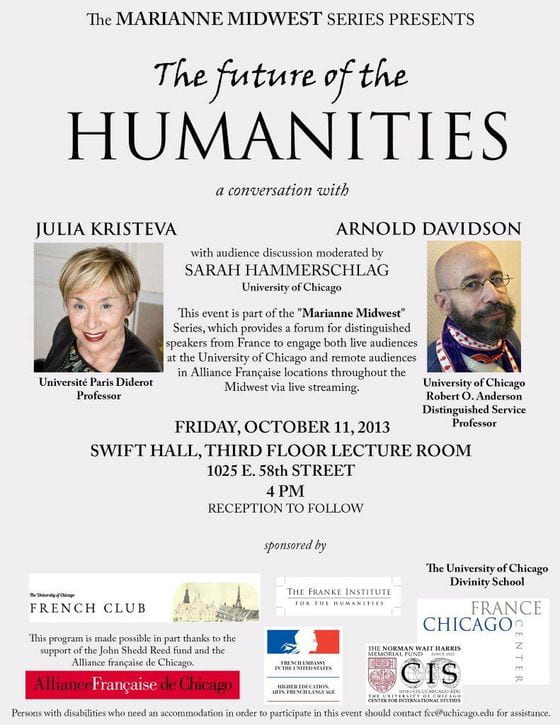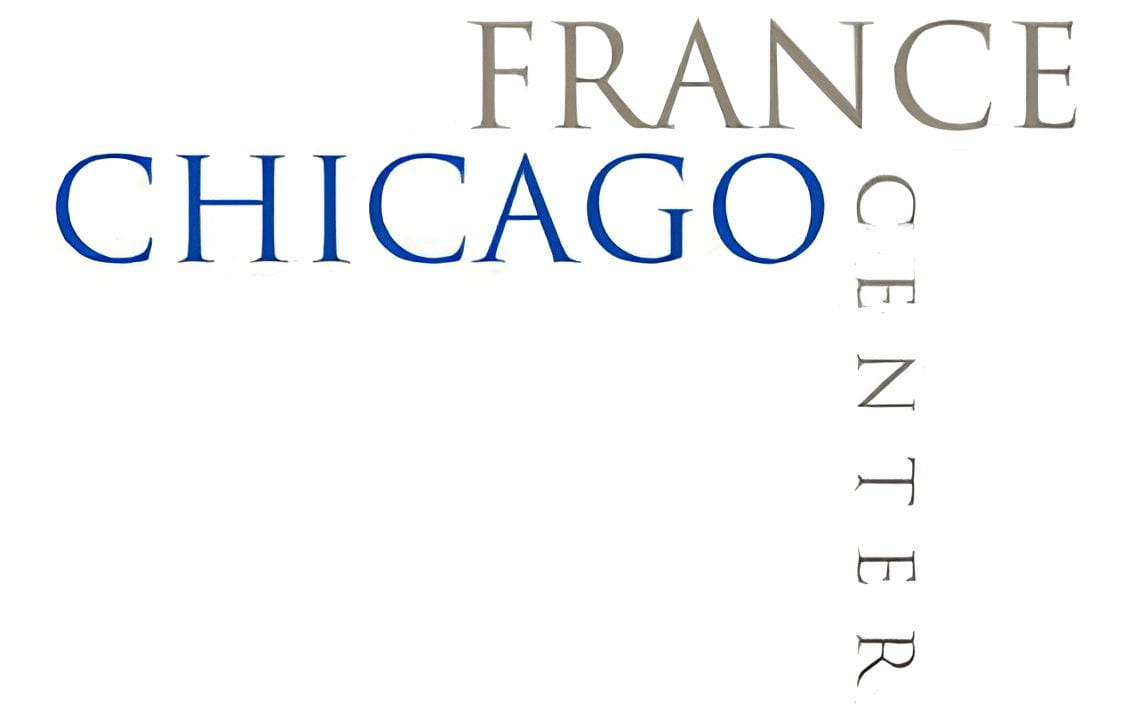The Future of the Humanities: A Conversation with Julia Kristeva and Arnold Davidson
October 11, 2013
1 hour 52 Minutes
Swift Hall, University of Chicago
Program Overview
In this discussion, Julia Kristeva (Université Paris Diderot) and Arnold Davidson (Robert O. Anderson Distinguished Service Professor) discuss the future of the Humanities in North America and Europe. Referencing, several thinkers such as Michel Foucault, Primo Levi, and Immanuel Kant, this discussion touches on a range of issues concerning the humanities. The program starts with Kristeva’s presentation of the crisis of civilization. She explains that our cultural heritage is one of questioning and discusses the concept of “humanism.” Arnold Davidson presents his idea of humanism and the concept of “humanities.” Moving on, he describes reading as a spiritual exercise and the importance of communication.
After each speaker has a chance to comment on what was said by the other, the moderator, audience, and satellite locations are invited to ask questions. Sarah Hammerschlag acts as the moderator, introducing the speakers and guiding audience discussion. Satellite locations in Minneapolis, Milwaukee, and Kansas City participated in this program via webcast.
Outline of the Program
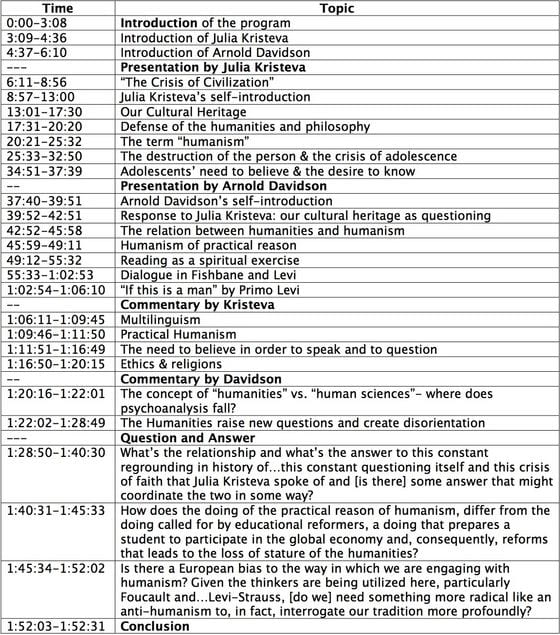
About Julia Kristeva
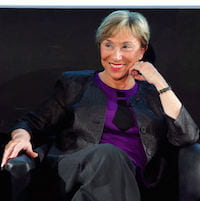
Julia Kristeva is a writer and psychoanalyst. A professor emeritus at the University of Paris Diderot-Paris 7, she has taught in the US, Canada, and Europe. She is also an Officer of the Legion of Honor, Commander of the Order of Merit, and the first laureate of the Holberg Prize. She is the author of 30 works including, among others, Revolution in Poetic Language, Tales of Love, Black Sun, Hate and Forgiveness, The Incredible Need to Believe, Possessions: A Novel, and Murder in Byzantium.
About Arnold Davidson
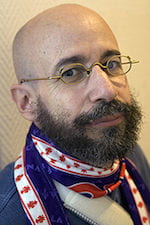
Arnold Davidson is a professor at the University of Chicago who teaches across several departments, including Philosophy, Comparative Literature, and Romance Languages and Literature, and plays a role on the Committee on the Conceptual and Historical Studies of Science and in the Divinity School. He has taught at many French institutions, such as the Collège de France and the ENS. Davidson was named an Officer in the Ordre des Palmes Académiques. He has published works in French, Italian and English, including The Emergence of Sexuality: Historical Epistemology and the Formation of Concepts (2001).
Discussion Questions
1. Outside of the classroom, where do you see examples of a “toolbox” culture that Julia Kristeva describes rather than a culture that questions meaning?
2. How does Kristeva’s treatment of the term “humanism” compare to that of Davidson’s?
3. Arnold Davidson talks about the ability of reading to help us ask questions about ourselves. What are some examples of works that have inspired self-examination in you?
4. What is the relationship between belief/religion and the humanities?
5. How would you define the concept of “humanities”?
6. Taking into account the remarks of Kristeva and Davidson, what do you think is the value of the humanities in the modern world?
A Selection of Works Referenced by the Speakers
Referenced by Julia Kristeva
Malala Yousafzai honored by Nobel Peace Prize nomination for her advocacy work (Daily News)
Immanuel Kant on Intellectual Property (Corups mysticum) by Riccardo Fozzo
Martin Heidegger’s Letter on Humanism (Translated by Frank Capuzzi)
Some principles for the humanism of the 21st century (Kristeva 2011)
Referenced by Arnold Davidson
Ethics and Sacred Attunement by Michael Fishbane
Summary of The Drowned and the Saved by Primo Levi
Profile of Primo Levi & his poem “If this is a man”
What is Enlightenment? by Michel Foucault
In the Time of Nations (A l’heure des nations) by Emmanuel Levinas
Other Resources
Philosophers Move to Take Humanities Back to the Future (The Chicago Maroon)
In this article published in the University of Chicago’s newspaper, a student describes his experience and what he learned from attending the program. It summarizes the main talking points of Julia Kristeva and the response made by Arnold Davidson.
As Interest Fades in the Humanities, Colleges Worry (The New York Times)
The author focuses on the declining interest in the humanities fields in favor of the sciences and other STEM fields in American universities, with a particular focus on Stanford University. It relates students’ concerns about the value of the humanities when faced with a competitive job market.
The Fate of the Humanities (The New York Times)
This article consists of an introduction to the debate about the fate of the humanities in universities and the responses of six professors. The articles talk about various aspects of the “crisis of the humanities,” including economic concerns, consumer culture, and a partnership between the humanities and the sciences.
This is Julia Kristeva’s official website. Here, one can find her biographical information, bibliography, events, photos, and videos. Additionally, there are lists of her texts in French and English with links to the texts themselves.
Arnold Davidson Faculty Page (University of Chicago)
This webpage from the Department of Philosophy at the University of Chicago details Davidson’s academic work and awards. Here, one can find recent news, a list of works and publications, reviews, and courses that he has taught at the University of Chicago.
Kristeva Biography (from The European Graduate School)
This site consists of a comprehensive biography of Julia Kristeva by the European Graduate School. It describes her work with Tel Quel and the history of her work in literature, linguistics, and psychoanalysis.
Julia Kristeva: A Bibliography (by Hélène Volat)
This site is a bibliography of Julia Kristeva by Hélène Volat. It lists her works, including books, contributions, articles, and interviews in chronological or alphabetical order. For each title, there is a list of available translations. Additionally, this website includes a list of resources about Julia Kristeva and her work.
Video: On Jula Kristeva’s Couch (Chicago Humanities Festival)
Presented by the Chicago Humanities Festival, the program took place the same weekend as “The Future of the Humanities.” Julia Kristeva talks to Northwestern University Professor, Jules Law, about her work and influence.
Recordings: Arnold Davidson’s lectures and articles from the University of Chicago
This resource provides access to recorded interviews and lectures by the University of Chicago’s professors in the Department of Philosophy. There are several links to interviews and lectures by Davidson, including some in English and French.
Book: The Kristeva Reader (Edited by Toril Moi)
This is an online version from Internet Archive of The Kristeva Reader edited by Toril Moi. This work contains an introduction to Kristeva’s writings and a selection of her essays in two parts: Linguistics, Semiotics, Textuality and Women, Psychoanalysis, and Politics. To aid comprehension, the book provides a short introduction before each essay.
This program made possible with the support of the following
Consulate General of France in Chicago
Alliance Français in Chicago
France Chicago Center
UChicago French Club
The Franke Institute for the Humanities
The University of Chicago Divinity School
The University of Chicago Center for International Studies
